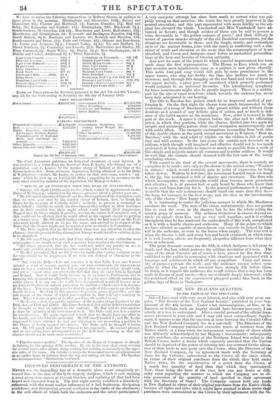IMPROVED PERFORMANCE OF THE ANTIGONE.
NETER was the impending fate of a dramatic piece more completely re- ' 'versed than in the case of the lyric tragedy Antigone which is now running a most prosperous career at Covent Garden, and realizing all that had been hoped and expected from it. The first night merely exhibited a disorderly „rehearsal, with the usual malign influences of a bad beginning, dissipating confidence, and threatening general confusion in the ranks of the choristers; in the evil effects of which both the orchestra and the actors participated.
A very energetic attempt has since been made to correct what was pal- pably wrong on that occasion: the music has been greatly improved in the general execution; and this part represented with more fidelity to the ori- ginal has elevated the whole. Vandenhoff and Miss Vandenhoff have ad- vanced in favour; and though neither of them can be said to possess a voice favourable to "the golden cadence of poesy," and their delivery in scenes of passion smacks strongly of the old theatrical conventions, yet the situations are favourable to them; and the simple, sturdy, and sententious style of the ancient drama, joins with the music in conferring such a cha- racter of truth and elevation on the scene that the commonplaces of it are absorbed, and Creon and Antigone stand before us undoubted personifica- tions of the hero and heroine of Grecian antiquity.
And now for some of the points in which especial improvement has been made since the first representation. The Hymn to Eros, which was on that occasion most injudiciously sung as a quartet, is now given chorally. This noble four-part song would still gain by more prominence in the upper tenors, who sing too feebly; the time also inclines too much to slowness; and, through this dragging on the one hand and want of force in the upper melody, a piece goes off unnoticed which properly performed would certainly be an universal favourite. The introductory symphony for brass instruments might also be greatly improved. There is a middle- part for the alto or tenor trombone, which towards the cadence has never been duly articulated in our hearing.
The Ode to Bacchus has gained much by an improved method of per- forming it. On the first night the chorus were much incommoded by the evolutions of a troop of Bacchantes, who passed within and without them destitute as it seemed of any definite plan of action, and as much in defi- ance of the ballet-master as the musicians. Now, order is restored in this- part of the work. A space is cleared before the altar and its officiating priest, in which they perform, while the chorus, divided into two parts for strophe and antistrophe, pursue their vocal occupation uninterruptedly and with noble effect. The energetic exclamations resounding from both sides of this double chorus in the quick second movement in B minor, "Hear us, Bacchus," with the mad whirl of triplets on the violins, is full of poetic- fury and wild ecstacy. In the last scene the curtain now descends on a tableau, which though well imagined and effective should not be too much prolonged; it being desirable to remove as much as possible from a work of this simple and majestic nature all common and popular artifices. It would be well that the curtain should descend with the last note of the lovely concluding chorus.
With regard to the time of the several movements, there is scarcely an exception to be made; save only to the chorus in the second scene," Wonders in nature," which would certainly gain in point of expression by being taken slower. Written in 6-8 time, the movement hurried tends too much to the jig, but restrained is full of dignity and sweetness. The flute solo. which accompanies the antistrophe would then become more prominent and effective: it is at present lost, or only heard by those who know that it exists and listen intently for it. In the general performance it is perhaps desirable that the solo instruments should stand out more than they do,— the harp, for instance, in the first scene, and the oboe in the introductory solo of the chorus "How happy they."
It is interesting to notice the judicious manner in which Mr. Macfarren conducts the work. The state of his vision, unfortunately, does not permit him to read the score at the theatre; but he has the whole within the mental grasp of memory. The arduous recitatives in chorus depend en- tirely on signals from him, and go very well together; and it is evident throughout that he has mastered the entire details of this work, complicated as it is with a double chorus and orchestra. Many of the points to which we have alluded as capable of amendment, can scarcely be judged by him- self in the orchestra, or even in the house when empty. The true test is when the theatre is full, and every box and bench crammed; at which time, it is well known effects are frequently altogether different from what they were at rehearsal.
The great dramatic scenes are the fifth, in which Antigone is led away to death, and the last, which portrays the sublime desolation of Creon. The- scope of the great dramatic art of music is here, almost for the first time, exhibited to the public in connexion with situations and associated with a language and sentiments in which all can sympathize. Unity and inten- sity of purpose pervade the work; and the audience cannot refuse sym- pathy to what the poet and musician have strongly felt before them. In truth, as it regards the audience, the result evinces that a step has been made in favour of good music,—they arc evidently deeply interested; while the combined effect on the experienced playgoer carries him back to the golden days of Kean in Shakspere.


























 Previous page
Previous page